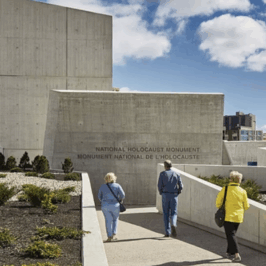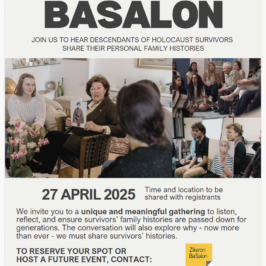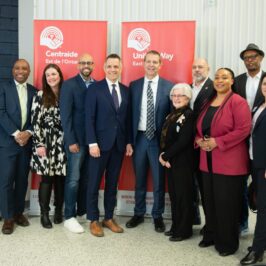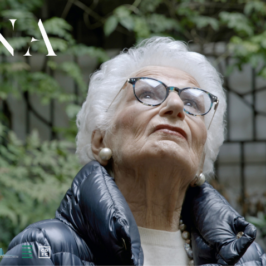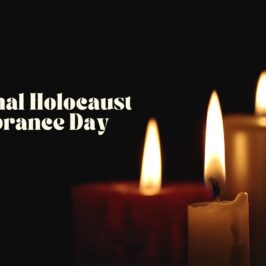By Judy Young Drache
A CHES-RCMP webinar for RCMP officers on April 5th, 2022
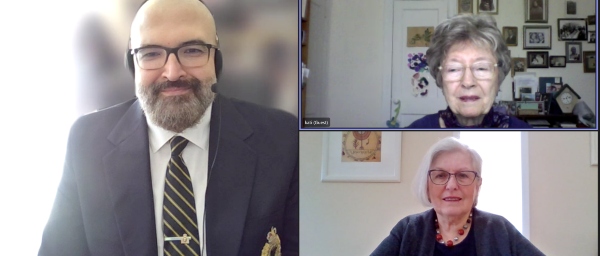
CHES and the RCMP are creating two important programs that will be open to RCMP members across the country. In recognition of April as Genocide Remembrance, Condemnation and Prevention Month, the first program, A Hidden Child, Never Silenced – A Holocaust Survivor’s Story, took place online on April 5th and featured Kati Morrison, a child survivor from Hungary. A second program, an in-depth examination of traditional and modern antisemitism, will take place in the fall.
After a welcome and introduction by RCMP Officer Sam Jaroudi, head of the Vulnerable Persons’ Unit at National RCMP Headquarters, CHES Chair Mina Cohn provided background information on CHES’s ongoing work in developing educational resources and programs about racism and antisemitism. She explained that Kati’s story is one of a series of Holocaust survivor testimonies recorded by CHES which describe survival experiences in various parts of Europe. The testimonies are archived at the Carleton University Library and the US Holocaust Memorial Museum in Washington.
Mina introduced Kati and provided a brief outline of the historical background on the Holocaust in Hungary. Kati then made introductory remarks to place the story of her family’s fate during the Holocaust into the context of how racism and hatred can lead to aggression and even to genocide. The connection between racism and aggression remains important and of concern to police forces in Canada and elsewhere in the world, as witnessed recently in Ottawa during the Truckers’ Rally and Occupation.
Kati explained that she started sharing her story by accident but believes in the importance of doing so. Over the last 15 years, she has gone to schools to speak about the dangers of discrimination and exclusion on the basis of racial, religious, or ethnic grounds. Most of her extended family were murdered in the Holocaust simply because they were Jews who happened to be living in Hungary, a collaborator with Nazi Germany during World War II. At the time, no countries, including Canada, were willing to save Europe’s Jews.
One of her important points was that antisemitism is alive and well in many parts of the world. She said it is good to know that Canada has laws against racism and antisemitism and that soon Holocaust denial will be criminalized. She pointed out that even though we now have many organizations and programs to fight all forms of racism, including antisemitism, the largest number of reported hate crimes in Canada still target Jews.
After the screening of her testimonial video, Kati answered questions and noted that it was purely by chance and a series of coincidences – “miracles” – that she and her closest family members survived, while 31 family members did not. She was fortunate in having parents who were resilient and did not teach her to hate others but looked to the future with hope. At the same time, she and her family certainly paid a heavy emotional and psychological price for their survival. One of her answers revealed that her father, despite his positive outlook and contributions as a teacher, “lived in eternal grief” inside and her mother suffered from depression throughout much of her later life.
Nevertheless, Kati feels optimism when she speaks in schools and sees students, teachers, and others looking after those who are more vulnerable. As a practicing psychiatrist, she has found examples of individuals who have succeeded in overcoming difficulties and believes that society can move away from hatred. Extreme bullying is learned and can be unlearned. The values of openness and accepting differences can also be taught. We are all responsible for our own behaviour: institutions must not propagate hatred and individuals should not stand aside and look away when others are being bullied. This applies to countries as well as individuals. Her concluding response to the final question was: “We should make the world a better place and refuse to live with hate.”
Kati Morrison’s presentation successfully combined the personal with the universal thus demonstrating the effectiveness of Holocaust testimony in the fight against antisemitism. Close to 200 RCMP staff participated in the webinar, and it was clear from the number and quality of the questions that there was a lively interest in that fight.

